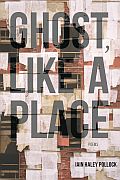The park is stripped down for winter,
and I won’t be here when it transforms
to a green cathedral, all still and solemnin the high humidity—we leave the city
in June. This commute, these acres of gray
trunks sprawling up slopes on either sideof the road, will be my last idea of this town.
With all the bareness, even at speed, I can see
far into the woods, the only hint of foliagedeep green ellipticals of rhododendron curling
in the cold and the blanched, marcescent leaves
that beeches refuse to drop. A stone walllines the road margin where a creek ran
until the city tunneled its water into a sewer line.
(A gap for a footbridge still interrupts the masonry.)Before the park, the houses were like the one
I just left, where my wife is shading her eyes
and straightening her cardigan. Now that the roadhas wound out of the valley, the houses have changed
from brick and flat-roofed to gabled and stone—
same rock as the wall, schist hauled up from the bedof a broader creek this road followed before bending
toward the buried tributary. On a stretch of pavement
here, every morning, I see the same womanwalking her beagle as it strains against its lead, the same
man dashing toward Upsal and the train. Above us,
the sun burns a light spot in the ashen expanseof cloud, a dull shine like an answer to a question
about a time or place that I know I should know
but cannot, cannot bring myself to remember.
The Road Will Be My Last Idea
Feature Date
- December 27, 2018
Series
Selected By
Share This Poem
Print This Poem
Copyright © 2018 by Iain Haley Pollock
All rights reserved.
Reproduced by Poetry Daily with permission

Iain Haley Pollock’s debut collection, Spit Back a Boy, won the 2010 Cave Canem Poetry Prize. He teaches English at Rye Country Day School in Rye, New York, and is a member of the poetry faculty at the Solstice MFA program of Pine Manor College. He also serves as a poetry co-editor at Solstice Literary Magazine. (Author photo by Rachel Eliza Griffiths)
“. . . Pollock delivers moments of levity, lyric beauty, and a creeping melancholy that lend his work its distinct atmosphere.”
—Publishers Weekly
“Iain Pollock’s eye is guided by passion—a passion for the city and street life, and the hard facts of individual lives amidst the violence and turmoil of American life today. But given this material, and contrary to what Derek Walcott once called the ‘standard elegiac,’ his poems never moralize or forsake complexity of feeling. His ear for idiom is pitch perfect, and the forward drive of his syntax embodies an undeluded but fundamentally hopeful vision about remaking the world.”
—Tom Sleigh
“The ghosts that haunt Iain Haley Pollock’s poems have substance. Some have names: Tamir. Rex. Emmett. Black boys of Philadelphia. Their voices are ‘the chattering of crows in a distant sycamore.’ There is awe in these voices, and self-deprecation, and lament. Most—despite the fact that there is little comfort to offer here—there is a faith in the body, in humanity, to bear its burdens.”
—Meg Kearney
Poetry Daily Depends on You
With your support, we make reading the best contemporary poetry a treasured daily experience. Consider a contribution today.




